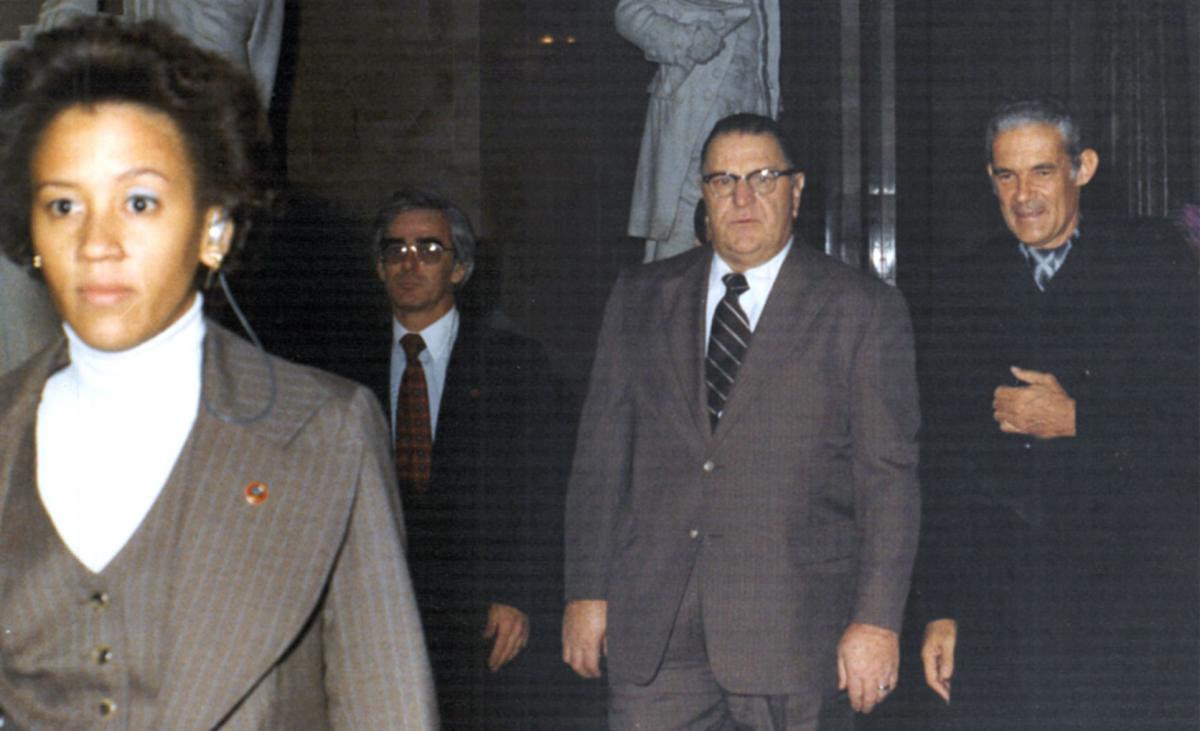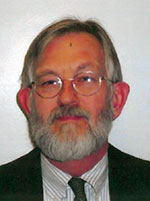A Foreign Service Officer's Alzheimer's Journey
This is the heartbreaking story, told by a devoted spouse, of a vibrant and trailblazing FSO’s descent into the most insidious form of dementia.
BY JOHN COLLINGE

Secret Service Agent Zandra Flemister (left) escorts Prime Minister of Jamaica Michael Manley (far right) during his visit to Washington, D.C., in December 1977.
Courtesy of John Collinge
Dementia / Alzheimer’s Resources
Alzheimer’s Association
National Capital
Area Chapter
(800) 272-3900
www.alz.org
IONA
(202) 895-9448
info@iona.org
www.iona.org
Georgetown University
Department of Neurology
Memory Disorder Program
(202) 784-6671
Johns Hopkins
Memory and Alzheimer’s Treatment Center
(410) 550-6337
The Neurology Center
Chevy Chase, Md.
(301) 562-7200
www.neurologycenter.com
Arden Courts
Linda Ryan, Marketing Director
(301) 493-7881
linda.ryan@arden-courts.com
www.arden-courts.com/Kensington
Books
The 36-Hour Day
Nancy Mace and Peter Rabins, 5th edition, 2012
A basic resource on recognizing and responding to dementia-related illness.
The Theft of Memory: Losing My Father One Day at a Time
Jonathan Kozol, 2015
A very personal and honest account of a son’s experiences.
—John Collinge
This is a cautionary tale about what early-onset Alzheimer’s did to a colleague, my wife Zandra Flemister. No Alzheimer’s case is alike, but instances of the disease are growing all too prevalent. Its onset is very easy to miss or misidentify. As yet there is no means of prevention and no cure, but there are measures that can be taken to soften the impact. We managed to take most of them, but we did a lot of groping. I hope our journey can help others if they must travel that road.
Zandra joined State in June 1978. The Foreign Service was her lifelong goal, and she loved the challenges of consular work. In 2006, after her most challenging and rewarding assignment—supervisory consul general in Islamabad—Zandra was selected for the Senior Foreign Service. She didn’t know that she was in the early stages of Alzheimer’s. In 2010, having struggled while serving as State’s deputy at the Terrorist Screening Center, she knew that another foreign assignment was out of the question. Only a few months into a tour at the Board of Examiners, she knew she could not master the job and made the painful decision to request retirement. Zandra had just turned 59.
Alzheimer’s is the master thief. First it stole her career, next her memory, then her personality. In time, it will kill her. She is 64.
A Slow Decline into Professional Ineffectiveness
Alzheimer’s creeps up and envelops like the fog. In most instances there is no knowing why, certainly not in Zandra’s case where there was no family history of dementia. However, ongoing research into why women develop Alzheimer’s at a higher rate than men points to the effect of stress, estrogen and surgical anesthesia. Concussion may also play a role. Zandra led a controlled-stress life typical of a Foreign Service officer in this age of terrorism. She added juggling career and raising a moderately autistic son.
Before joining State she pioneered as the first African-American woman selected to be a Secret Service agent, spending much of her four years protecting the family members of Presidents Gerald Ford and Jimmy Carter. She also suffered a serious concussion in an auto accident during the 1976 presidential campaign. Chronic fibroids prompted five surgeries during her Foreign Service career and recourse to the estrogen patch for nearly 20 years.
We do not know when her Alzheimer’s began, but in 2005 as she prepared for assignment to Pakistan she was struggling with her memory. We thought it was stress, and she started mental exercises and medicines to cope. I noticed some slippage in Zandra’s spelling (an early indicator, had we known), but she continued to perform at a high level. In Islamabad she earned Ambassador Ryan Crocker’s respect, won a Superior Honor Award for her role in the aftermath of the October 2005 South Asia Earthquake, handled two very sensitive visa cases under congressional and press scrutiny and oversaw the administrative arrangements after a fatal terrorist attack.
In 2006, Zandra joined the Office of the Inspector General, where she performed effectively. As she contemplated the 2008 assignment cycle, she was conscious of memory loss but confident she could continue to manage this condition. We did not suspect Alzheimer’s. Her logical assignment was another tour as a consul general. For family reasons, she chose a domestic assignment as State’s deputy director of the Terrorist Screening Center, an FBI-run interagency facility.
The job seemed ideal, drawing on Zandra’s law enforcement background and 30 years of State Department experience including running interagency visa screening programs in Pakistan and South Korea, establishing a multinational anti-visa fraud working group in London, and extensive counter-narcotics experience in Pakistan and the department. But Zandra’s advancing Alzheimer’s compromised her ability to perform at a level expected of a Senior FSO. She was resorting to “management by sticky,” using extensive post-it notes to jog her memory. At the outset, she represented State on a series of quick trips to European capitals to negotiate information-sharing regimes. Zandra thought she was effective; the director did not, and stopped sending her. I believe her memory loss rendered her unable to realize her ineffectiveness. She was low-ranked by the 2009 Promotion Board. The thrust of the counseling statement was that she was not coming up to speed, was passive and did not pull her weight in negotiations.
A Relentless Hollowing Out
We finally realized in spring 2009 that the severity of Zandra’s accelerating memory loss required consulting a neurologist. After a battery of tests, she was diagnosed as suffering from progressive and irreversible memory loss. At that point the neurologist did not give us a diagnosis of early-onset Alzheimer’s. She did tell Zandra she was putting her on the standard course of medication for an Alzheimer’s patient, Namenda and Aricept, and that it might slow memory loss but could not reverse or stop it.
I do not know whether the neurologist thought an Alzheimer’s diagnosis was premature or whether she sought to cushion the blow. Had the diagnosis been more forceful, we might have discussed whether Zandra should have retired at that point. In any case, she was not ready to give up her career and was confident that her memory loss would otherwise leave her mind intact.
Zandra retired in April 2011. She lasted that long only because management at the Board of Examiners appreciated her illness and carried her on light duty until she could get into a retirement seminar. Zandra had planned to use her consular skills in post-retirement volunteer work, but would never work again. Her efforts to reach out to the Bethesda Naval Hospital to help families of wounded service members foundered. I recall her great frustration trying to find an entry point, and suspect her Alzheimer’s undercut her understanding of the application process. Zandra did receive a positive response some six months after her retirement from the Montgomery Public Library, but by then no longer was interested in volunteering.
Alzheimer’s is remorseless, and it steadily hollowed out Zandra. In July 2012, we took a cross-country train trip to Seattle. On the second night, Zandra became disoriented. When we reached Bellingham, she suffered her first travel panic attack and could not understand that we were several thousand miles from home. She rallied, but it was a foretaste of the panic attacks that ended her travels two years later. By 2013, Zandra could not understand finances. That year she also lost the auto navigation skills she had honed as a Secret Service agent. In 2014, she stopped driving and lost the ability to use the Metro without assistance.
Alzheimer’s also attacked Zandra’s personality. She lost her self-confidence and became cautious and passive. Following conversations became more difficult, and she withdrew socially—even from the company of close friends. She never lost her sense of humor or her politeness, but she became remote and often appeared dismissive. An observant friend said this was a defense mechanism, an assessment I share. Empathy deserted her, although she never knew it. Connections with family members faded, first for out-of-state relatives, then her understanding that she had a son and, finally, her ability to conceptualize our relationship as husband and wife.
Finding Resources

Zandra Flemister in Havana during a 2007 inspection team visit.
Courtesy of John Collinge
Through her neurologist, Zandra learned of a Georgetown Neurology Department long-term study aimed at determining if computer-based exercises, home drills and one-on-one verbal exercises with a speech pathologist could arrest memory decline. Zandra entered the study in January 2012 and participated until December 2014. We were told that we would not be informed of the specifics of her participation, so it is impossible to know if she derived any memory loss benefits. But participation gave her great emotional reinforcement.
Alzheimer’s is also consuming for the healthy spouse who steadily assumes the role of caregiver. In October 2011, I gave up a retirement job in the Office of the Historian because I could not balance full-time work and Zandra’s needs. I shifted to part-time work at the National Archives’ National Declassification Center. By 2013, I was managing Zandra’s affairs: although she still maintained limited independence, she was unaware of the extent of her disease and did not realize I was guiding her.
Friends could see the toll caregiving was taking and urged me to join a support group. A member of Zandra’s Foreign Service family (Ambassador Pat Butenis) recommended I explore the Iona Senior Services program, and I entered a caregivers support group in April 2014.
Connecting with Iona was one of two critical decisions that will shape Zandra’s continuing care. The other was her decision to take out an American Foreign Service Protective Association long-term care policy, which is greatly easing the burden of long-term care of $100,000 per year.
Through the Iona support group I learned of Iona’s Wellness and Arts Center, which Zandra joined on a part-time basis in December 2014 in an effort to break out of her growing isolation. She connected well with the staff and other center participants. We were gradually increasing her hours when she had a serious wandering episode last April, walking from Bethesda to Silver Spring via the Capital Crescent Bike Trail. After a 911 call, Zandra was found safe but oblivious.
It was apparent I could no longer leave her alone, and I knew I could not care for her at home—even with the help of health care professionals. Through Iona, I contacted Arden Courts in Kensington, Maryland. This is a 64-unit facility catering exclusively to dementia and Alzheimer’s patients. Zandra is doing well there. She is unafraid and oblivious to the world that she has lost—the only mercy Alzheimer’s has granted her. Zandra is not the first FSO to live out her life at Arden Courts, nor will she be the last.
Some Final Thoughts
Helping Zandra manage her descent into Alzheimer’s is the hardest emotional challenge I have faced. It is much harder than our son Sam’s autism. There, we reaped accomplishment. Alzheimer’s, by contrast, is an exercise in achieving a controlled crash. Drawing on the support of friends and support groups is essential to recognize and manage the inevitable stress buildup. Short breaks for respite are very helpful if they can be secured.
Alzheimer’s onset is exceedingly hard to detect. I can only recommend that if you or others notice memory loss, mood change or the beginning of mental rigidity, consult a neurologist. There are some useful precautionary steps you can take regardless of whether Alzheimer’s ever becomes a concern. These include: have a joint account—insurance checks will come to the policy holder; take out long-term care insurance; secure a power of attorney; have a will, and update it frequently; have a medical directive. If you get an Alzheimer’s diagnosis and have not taken these steps, do so immediately before legal competency becomes an issue. Also consult a lawyer to determine if you need to set up a special needs trust for the benefit of the Alzheimer’s patient—you can’t guarantee you’ll die last.
Zandra has made a remarkably smooth adjustment. I think it helps that her form of Alzheimer’s has caused her to steadily withdraw into herself, although her steady loss of connection to me is painful. She is always comfortable in my presence when I visit, but there are now times when I am not at all sure she knows who I am, and I know the day is coming when her memory of me is gone.
Read More...
- Long-Term Care Calculator (American Foreign Service Association)
- Changes to Your Relationship (Alzheimer’s and Dementia Caregiver Center)
- Caring for a Person With Alzheimer’s Disease: Your Easy-to-Use Guide from the National Institute on Aging (National Institute on Aging)





